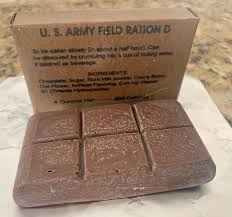
As we mark the 80th Anniversary of the D-Day operations of June 1944, which signalled the beginning of the end of the Second World, we look at the small, but important part which chocolate played during this time.
While we’re all familiar with war rationing, and the fact that sweets (including chocolate were heavily rationed in Britain during and immediately after much of the Second World War, did you know that chocolate was a key feature in both providing energy and crucially motivation and morale boosting for the troops?

Chocolate Poppy
The D-Day landings on the beaches of Normandy were the largest amphibious military invasion every assembled. But before the all clear was given, American service personnel had been gathering on this side of the Channel for some time in preparation for what was to come. Almost 3 million American troops who passed through the UK en route to continental Europe. Brining with them a seemingly endless supply of chocolate bars and Coca-cola, they were to have a considerable influence on the experiences and culture of the British people they encountered.

D Ration Chocolate Bar
American and British troops had chocolate bars as standard issue in their 24 hrs D-ration packs, including on D-Day itself. Eyewitness accounts of British and American troops eating chocolate on the front-line, state how much comfort they derived from the simple taste of chocolate. That chocolate accompanied the troops, was no accident. It was provided on D-Day for a specific reason – it is a high energy food and the caffeine provided a powerful stimulant – keeping the soldiers alert and engaged. Chocolate provided an important morale boost at critical moments during the fighting.
So not only did the troop morale, energy and focus improve with chocolate during D-Day and the latter parts of the war, if D-Day hadn’t happened, we would not be here at all, as significant proportion of chocolate in the UK is processed in Belgium, before crossing the channel.
You can try making your own D-Ration chocolate bar, by clicking here, thanks to the 101st Airborne Division Reenactment Societies carefully researched recipes. However, be warned – this is not like chocolate as we know it today!
